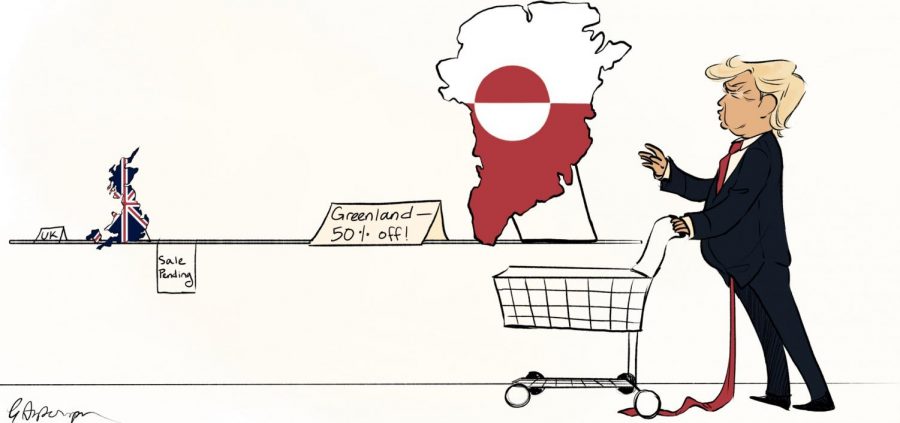Leaders Should Focus on Environment, Not Profits
November 1, 2019
Every decision made by today’s leaders will shape the future of the planet. The U.S. is choosing to consume fossil fuels and pollute our planet, furthering climate change. By seeking more of this fuel, the Earth is being destroyed even more.
In August 2019, the White House revealed its desire to purchase the Danish territory of Greenland for economic and geopolitical reasons. The Danish prime minister was very swift to reject the offer, but one thing is clear: the U.S. government has no problem benefiting from climate change’s detrimental effects. The U.S. should not seek to profit from climate change’s consequences and should try to have more environmentally-conscious leaders.
Expanding to Greenland would give the U.S. access to vast oil fields. The Arctic Circle bears 240 billion proven barrels of oil and natural gas, according to a 2008 U.S.Geological Survey, which is about 13-16% of the world’s total oil reserves. However, in the past, a lack of infrastructure made extraction unprofitable. Since arctic ice has melted, at the hands of global warming, extraction has become cheaper and easier.
Greenland has lost as much as 11 billion tons of ice in one day, according to a 2018 National Oceanic and Atmospheric Administration (NOAA) study. The most northern parts of the planet experience climate change twice as much as the rest of the world. Frost melts, exposing the earth to the sun, causing it to absorb more heat, melting more frost.
Arctic oil should remain untapped.
“If we want climate change to stay manageable, according to one recent study, Arctic oil and gas are high on the list of hydrocarbons we should leave in the ground,” according to a 2016 National Geographic article.
Benefiting from climate change is a double-edged sword. More oil becomes available and benefits the economy, but climate change persists, causing severe weather to become stronger and more frequent due to climate change. The strength of a storm increases 25-30% per degree of global warming, according to Yale Climate Connection. Since 2008, there has been a great increase in the proportion of category 4 and 5 storms. Hurricane Dorain is the latest example of this, ravaging the southeast while slowly moving its way north, causing at least 51 deaths and 1300 missing persons, according to NPR and an estimated cost of damage between 1.5 to three billion in damages according to CNBC.
Although these consequences are dire, the U.S.’ attempt to purchase Greenland is for economic and geopolitical reasons. Greenland is between Russian and North America and controls the straits that connect the Arctic and North Atlantic oceans together. The geographic position gives Greenland significant trade and militaristic potential.
A Greenland purchase would serve mostly to control trade routes, oil reserves and give the U.S. military advantage. However, the strategic position of Greenland has decreased in usefulness, given the United States has nearly 40 military bases around the world according to a Smithsonian Institute study.
The consequences of climate change outweigh the benefits gained from exploiting resources. Trying to gain access to more petrol not only amplifies the climate change issue, but it shows the environmental apathy of the leaders.
Ironically, the Environmental Protection Agency’s (EPA) director, Andrew Wheeler, is a massive environmental apathetic, selected by President Donald Trump and approved by the senate in 2019 to manage the nation’s environmental policy.
“The policies he has supported as acting administrators are not in the best interest of our environment and public health, particularly given the threat of climate change to our nation,” Senator Collins (R-ME) said in a 2019 New York Times article.
While Congress and regulatory agencies ignore the consequences of climate change they live with the consequences just like the rest of the public. The D.C. metropolitan area has warmed by more than two degrees over the past century. As a result, harsh hot days and heavy rainstorms are more frequent. Higher temperatures have caused the drying of soil, increasing the likelihood and intensity of floods. Heavy rainfall has overwhelmed D.C.’s century-old wastewater system, leading to raw sewage being dumped into the Anacostia, Rock Creek, and Potomac Rivers. The irony in this is that the U.S. politicians who make decisions that impact climate work by local rivers.
Climate change is one of the greatest threats to civilization today, it is ironic to try to profit from its disastrous consequences and the state should stop. American policy continually points towards profits over the planet, which is a trend that must end for the sake of humanity.





